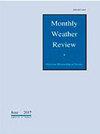利用集合灵敏度分析在高分辨率模拟超级单体中识别与龙卷风形成相关的风暴特征
IF 3
3区 地球科学
Q3 METEOROLOGY & ATMOSPHERIC SCIENCES
引用次数: 0
摘要
本研究旨在通过高分辨率超级单体模拟,客观地确定与龙卷风样涡旋(TLV)形成相关的风暴尺度特征。使用云模型版本1(CM1)创建了51个超级单元的集合。2011年5月24日,第一个成员在俄克拉荷马州埃尔雷诺附近使用快速更新周期(RUC)近程探测填充的基本状态进行初始化。其他50个系综成员是通过在超晶胞形成后随机扰动基态而产生的。系综成员之间存在相当大的差异,一些超单元产生强大、长寿命的TLV,而另一些则根本不产生TLV。使用集合灵敏度分析(ESA)技术对集合进行分析,揭示了与TLV形成动态相关的风暴尺度特征。在后缘,TLV东南表面的辐散有助于会聚和收缩现有的垂直涡度,但对后缘流出温度没有显著的敏感性。在前缘,冷池内的温暖温度对TLV的产生和大小很重要。强流向涡度的纵向定位也是TLV形成和强度的明确指标,尤其是在测量TLV的5分钟内。本文章由计算机程序翻译,如有差异,请以英文原文为准。
Using Ensemble Sensitivity Analysis to Identify Storm Characteristics Associated with Tornadogenesis in High Resolution Simulated Supercells
This study aims to objectively identify storm-scale characteristics associated with tornado-like vortex (TLV) formation in an ensemble of high-resolution supercell simulations. An ensemble of 51 supercells is created using Cloud Model Version 1 (CM1). The first member is initialized using a base state populated by the Rapid Update Cycle (RUC) proximity sounding near El Reno, Oklahoma on May 24, 2011. The other 50 ensemble members are created by randomly perturbing the base state after a supercell has formed. There is considerable spread between ensemble members, with some supercells producing strong, long lived TLVs, while others do not produce a TLV at all. The ensemble is analyzed using the Ensemble Sensitivity Analysis (ESA) technique, uncovering storm-scale characteristics that are dynamically relevant to TLV formation. In the rear flank, divergence at the surface southeast of the TLV helps converge and contract existing vertical vorticity, but there is no meaningful sensitivity to rear-flank outflow temperature. In the forward flank, warm temperatures within the cold pool are important to TLV production and magnitude. The longitudinal positioning of strong streamwise vorticity is also a clear indicator of TLV formation and strength, especially within 5 minutes of when the TLV is measured.
求助全文
通过发布文献求助,成功后即可免费获取论文全文。
去求助
来源期刊

Monthly Weather Review
地学-气象与大气科学
CiteScore
6.40
自引率
12.50%
发文量
186
审稿时长
3-6 weeks
期刊介绍:
Monthly Weather Review (MWR) (ISSN: 0027-0644; eISSN: 1520-0493) publishes research relevant to the analysis and prediction of observed atmospheric circulations and physics, including technique development, data assimilation, model validation, and relevant case studies. This research includes numerical and data assimilation techniques that apply to the atmosphere and/or ocean environments. MWR also addresses phenomena having seasonal and subseasonal time scales.
 求助内容:
求助内容: 应助结果提醒方式:
应助结果提醒方式:


